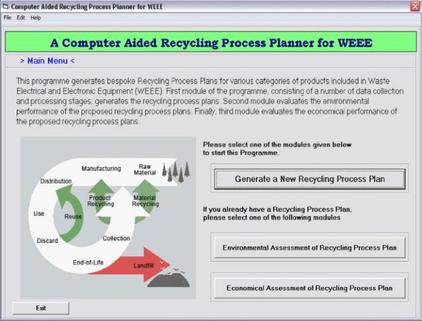
Summary: The overall aim of the research was to promote sustainable practices within the WEEE recovery industry through the application of a novel recycling process planning framework, and to generate an environmentally friendly and economically justifiable recycling process plan for individual products in e-waste.
Project Description: The rate of production of electrical and electronic equipment is rapidly increasing due to technological innovation, market expansion and shorter product life cycles. Thus, the ever-rising amount of waste from electrical and electronic equipment (WEEE) has become a common problem. Due to the cost/time bottleneck in the current recycling activities, it was found that recovery of end of life products is not carried out in the most economical and environment friendly way. This provided impetus for this research project to focus on recovery and recycling technologies as improvements would lead to a more effective end of life management of WEEE.
The current ad hoc applications of WEEE recycling are often based on limited knowledge and cannot cope with the complex range of materials and products contained within such waste. A knowledge-based approach has been utilised to investigate the realisation of a recycling process planner which aims to determine the most suitable end of life options for WEEE. A number of case studies have been used to show that a 20–30% improvement on economic and environmental performance could be achieved through adoption of such a systematic approach to recycling process planning.
The knowledge-based recycling process planner consists of four stages, namely a product evaluation, a legislative compliance monitoring, a recycling process planning, and an Ecological and Economical (Eco2) assessment. Due to significant requirements for information and knowledge processing, a Computer Aided Recycling Process Planning (CARPP) system was developed to assist designers, manufacturers, and recycling facilities in determining the bespoke end of life recycling process plans for individual products in WEEE.
Project Highlights/Deliverables:
-
Creation of a decision support system to identify the most appropriate end-of-life option for particular electrical and electronic equipment.
-
Development of a computer-aided recycling process planning system capable of generating a bespoke recycling process plan for an individual WEEE product.
-
To facilitate more effective end-of-life management of e-waste through sharing knowledge related to modern recovery and recycling technologies.